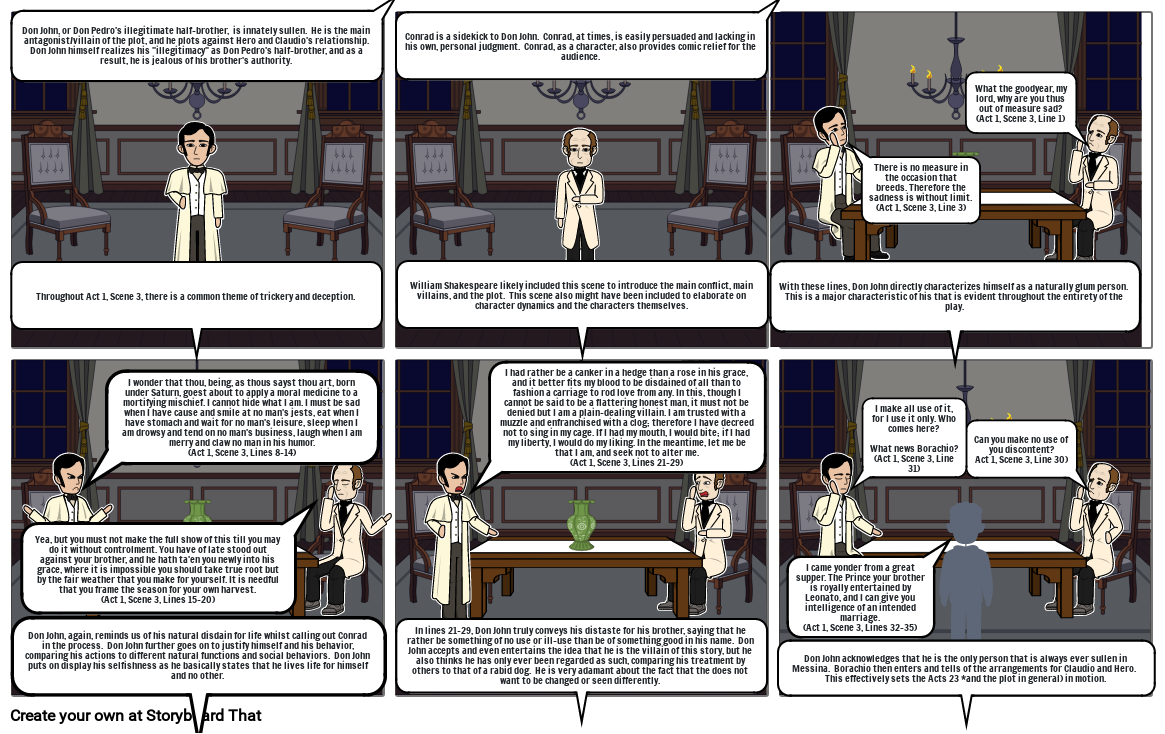Much Ado About Nothing Act 1 Scene 3 Analysis

Текст Раскадровки
- Throughout Act 1, Scene 3, there is a common theme of trickery and deception.
- Don John, or Don Pedro's illegitimate half-brother,  is innately sullen.  He is the main antagonist/villain of the plot, and he plots against Hero and Claudio's relationship. Don John himself realizes his "illegitimacy" as Don Pedro's half-brother, and as a result, he is jealous of his brother's authority.
- Conrad is a sidekick to Don John.  Conrad, at times, is easily persuaded and lacking in his own, personal judgment.  Conrad, as a character, also provides comic relief for the audience.
- William Shakespeare likely included this scene to introduce the main conflict, main villains, and the plot.  This scene also might have been included to elaborate on character dynamics and the characters themselves.
- With these lines, Don John directly characterizes himself as a naturally glum person.  This is a major characteristic of his that is evident throughout the entirety of the play.
- There is no measure in the occasion that breeds. Therefore the sadness is without limit. (Act 1, Scene 3, Line 3)
- What the goodyear, my lord, why are you thus out of measure sad? (Act 1, Scene 3, Line 1)
- Don John, again, reminds us of his natural disdain for life whilst calling out Conrad in the process.  Don John further goes on to justify himself and his behavior, comparing his actions to different natural functions and social behaviors.  Don John puts on display his selfishness as he basically states that he lives life for himself and no other.
- Yea, but you must not make the full show of this till you may do it without controlment. You have of late stood out against your brother, and he hath ta'en you newly into his grace, where it is impossible you should take true root but by the fair weather that you make for yourself. It is needful that you frame the season for your own harvest.(Act 1, Scene 3, Lines 15-20)
- I wonder that thou, being, as thous sayst thou art, born under Saturn, goest about to apply a moral medicine to a mortifying mischief. I cannot hide what I am. I must be sad when I have cause and smile at no man's jests, eat when I have stomach and wait for no man's leisure, sleep when I am drowsy and tend on no man's business, laugh when I am merry and claw no man in his humor. (Act 1, Scene 3, Lines 8-14)
- In lines 21-29, Don John truly conveys his distaste for his brother, saying that he rather be something of no use or ill-use than be of something good in his name.  Don John accepts and even entertains the idea that he is the villain of this story, but he also thinks he has only ever been regarded as such, comparing his treatment by others to that of a rabid dog.  He is very adamant about the fact that the does not want to be changed or seen differently.
- I had rather be a canker in a hedge than a rose in his grace, and it better fits my blood to be disdained of all than to fashion a carriage to rod love from any. In this, though I cannot be said to be a flattering honest man, it must not be denied but I am a plain-dealing villain. I am trusted with a muzzle and enfranchised with a clog; therefore I have decreed not to sing in my cage. If I had my mouth, I would bite; if I had my liberty, I would do my liking. In the meantime, let me be that I am, and seek not to alter me.(Act 1, Scene 3, Lines 21-29)
- Don John acknowledges that he is the only person that is always ever sullen in Messina.  Borachio then enters and tells of the arrangements for Claudio and Hero.  This effectively sets the Acts 23 *and the plot in general) in motion.
- I came yonder from a great supper. The Prince your brother is royally entertained by Leonato, and I can give you intelligence of an intended marriage.(Act 1, Scene 3, Lines 32-35)
- I make all use of it, for I use it only. Who comes here?What news Borachio?(Act 1, Scene 3, Line 31)
- Can you make no use of you discontent?Act 1, Scene 3, Line 30)
Создано более 30 миллионов раскадровок

